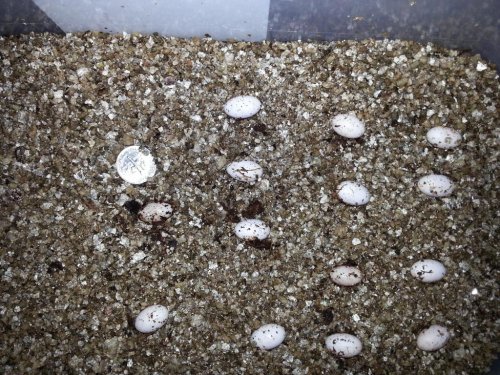jajeanpierre
Chameleon Enthusiast
I have a wild-caught female Trioceros quadricornis gracilior who presented me with eggs yesterday. She was imported early February.
Once she recovers from laying her eggs, I'll start her on a worming program. She has not been wormed yet. I want to get a fecal on her before I worm her to see exactly what I am dealing with.
I have a male gracilior from that same shipment that I hope to eventually breed her to.
I would like to get as many eggs from her that were sired by an unknown male that is (hopefully) completely unrelated to her and to my male before I breed her to my male. If I don't breed her and just let nature take its course, what percentage of fertile eggs is she likely to have? At the same time, I don't want to stress her with producing a clutch of mostly infertile eggs. Does it make sense to not breed her for the next clutch (if I'm so lucky to get another clutch)? My goal is to get a collection of breeding stock that is as unrelated as possible.
There are health reasons to not breed her as well. She has not yet been wormed on my vet's advice. The two males from the December import--same importer, same exporter--had roundworms, whip worms, flukes (could have been a stage of lung worms), flagellates, and giardia. I think that's everything. A young quad quad from the graciliors' shipment died of massive lung worms. I'm not crazy about introducing her to my male gracilior who will have just completed three or four treatments of dosing for 3 to 5 days in a row. That's a lot of manhandling for a newly imported wild caught.
Thoughts?
Once she recovers from laying her eggs, I'll start her on a worming program. She has not been wormed yet. I want to get a fecal on her before I worm her to see exactly what I am dealing with.
I have a male gracilior from that same shipment that I hope to eventually breed her to.
I would like to get as many eggs from her that were sired by an unknown male that is (hopefully) completely unrelated to her and to my male before I breed her to my male. If I don't breed her and just let nature take its course, what percentage of fertile eggs is she likely to have? At the same time, I don't want to stress her with producing a clutch of mostly infertile eggs. Does it make sense to not breed her for the next clutch (if I'm so lucky to get another clutch)? My goal is to get a collection of breeding stock that is as unrelated as possible.
There are health reasons to not breed her as well. She has not yet been wormed on my vet's advice. The two males from the December import--same importer, same exporter--had roundworms, whip worms, flukes (could have been a stage of lung worms), flagellates, and giardia. I think that's everything. A young quad quad from the graciliors' shipment died of massive lung worms. I'm not crazy about introducing her to my male gracilior who will have just completed three or four treatments of dosing for 3 to 5 days in a row. That's a lot of manhandling for a newly imported wild caught.
Thoughts?





